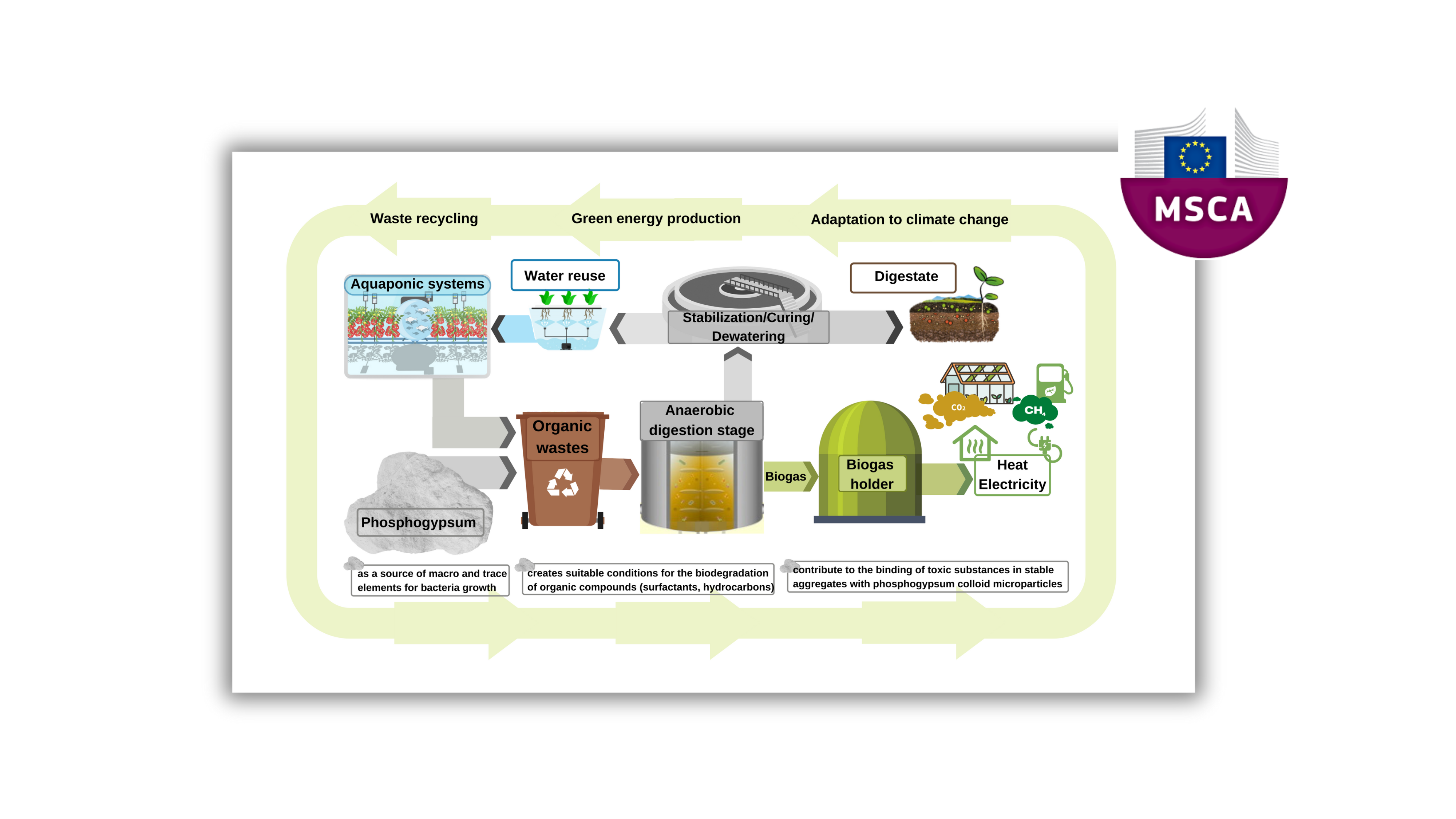The BRT is pleased to introduce the PG-BIOPRO (Phosphogypsum as a mineral resource for bioprocesses) [SH1] project. Led by Assoc. Prof. Dr. Yelizaveta Chernysh under the Marie Skłodowska-Curie Postdoctoral Fellowship (MSCA-PF) with funding from the European Union under the MSCA4Ukraine framework. It will run from 2023 to 2025.
The concept of this project is to develop integrated biotechnological solutions to produce biofuels and organomineral fertilizers. It is based on using organic waste as carbon substrates and phosphogypsum as a source of nutrients and trace elements for the microorganisms' growth during anaerobic digestion.
The World as we know it is quickly changing. Humankind is facing numerous crises far beyond the imagination of previous generations. The global energy and biodiversity crises stimulate our effort to find alternative and environmentally friendly energy sources to fuel growing populations worldwide. Renewable energy has been recognized as a viable strategy that meets the UN Sustainable Development Goals (SDGs). We urgently need new means to acquire sufficient nutrients and trace elements for the desired microbial activities that satisfy our need for biofuels, starting compounds for the chemical industry, etc.
Our PG-BIOPRO project will explore the use of phosphogypsum (PG), a chemical waste after fertilizer production from phosphate rock, by the wet acid method. Environmental concerns and increased costs of PG stockpiling call for better use.
In short, our project aims to:
- Research on PG as a nutrient resource for microbial associates during anaerobic digestion of organic waste;
- Develop a taxonomic classification and review of metabolic pathways of PG compound transformation with the use of electronic KEGG, MetaCyc and EzTaxon databases;
- Evaluate the fermentation waste properties as organomineral fertilizer using Life Cycle Assessment (LCA) approaches.
Scientific impact
We will obtain new scientific results based on the planned theoretical and experimental studies. Namely: (i) determining the patterns of using such chemical by-products as phosphogypsum as a new type of mineral supporting carrier (biocarrier) for the growth of microorganisms; (ii) the process of intensification of biofuel production will be scientifically substantiated; (iii) and environmentally friendly fertilizers production to restore the environment.
Our project will result in the following opportunities: LCA of theoretical and experimental research, including numerical simulation and physical modelling of biofuel production processes with waste recycling and producing a number of other bio-products; defining the economic strategy for the biofuel sector at a local level in different regions of Ukraine. Furthermore, the project results will refine the existing and develop new environmentally friendly resource-saving bioenergy technologies, assess their economic efficiency, clarify the technological requirements for operating the equipment, and prepare them for commercialization.
Societal impact
The proposed research will develop the capacity of Ukrainian scientists during the war in Ukraine, with the possibility of conducting research while staying in safe conditions with the involvement of the necessary material base through regular online lectures to Ukraine and the Open Science approach of CZU. Furthermore, the study’s results will significantly contribute to the development of the Sumy region and the labour force in the future post-war period.
Economic impact
The obtained products will be used in developing green energy and agroecology in Ukraine and the Czech Republic. We will promote sustainable bioenergy innovations in electricity and biogas production. Additionally, complex biotechnological methods for waste treatment will allow the restoration of contaminated soils in dump areas and improve their buffer properties.
Biofuel production is one of the most economically and environmentally beneficial solutions for organic waste material and chemical by-products such as PG. The actual level of energy recycling of such waste is far below our possibilities. The proposed solution will contribute to the diversification of available energy sources, the suppression of fossil energy use, and the neutralization of environmentally detrimental toxic wastes. Apart from the biogas and irrigation water, the end-products of fermentation of organic waste (such as sewage sludge, poultry manure, etc.) could be reused as artificial fertilizers.
Demand for global resources exceeded supply and drove up prices as economies recovered from the COVID-19 pandemic. This led to a global cost-of-living crisis characterized by rising energy and food poverty. The war in Ukraine considerably worsens this situation, which among other damaging aspects, causes severe disruptions in the fertilizer supply chain for all macronutrients. Our project is thus more than timely as we only need support to manage the transition from laboratory to semi-industrial scale. Furthermore, the possibility of cooperation with a number of companies interested in introducing PG processing into their production is also in the target area. It would be an ideal opportunity to introduce the recycling of PG into production practice and create urgently needed valorization perspectives.
Stay tuned for more updates on the PG-BIOPRO project!
For more details on BRT activities, follow us on social media for regular updates and highlights.


